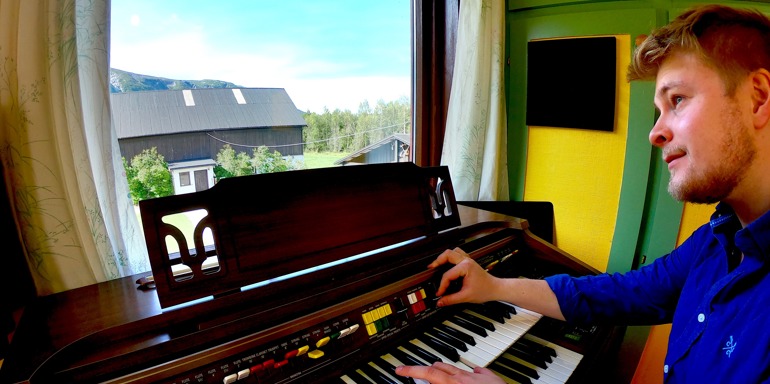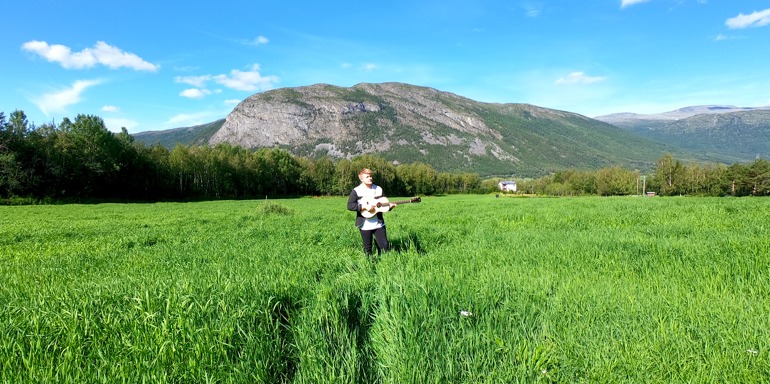
Course Studied: BA (Hons) Music (Jazz), MA Music
Top Career Highlights:
- Releasing my debut album 'I Fotefar'
- Founding 'Sound Mimic Records', a small record label
- Performing and recording the album 'Connection Made' with Leeds-based Jazz quartet 'Minus'
Bård Fransson is a jazz guitarist, composer and multi-instrumentalist from Norway. After graduating from Leeds Conservatoire, Bård has gone on to release his debut album 'I Fotefar', which was recorded on the farm where he grew up, alongside performing with jazz quartet 'Minus', and founding 'Sound Mimic Records'.
Bård's compositions are conceptual and his playing heavily relies on experimentation and a unique approach to improvisation, which is deeply rooted in jazz.
What made you decide to study in the UK?
It all happened very fast. Me and the other members of Minus at that time all auditioned together for Leeds Conservatoire when they came to our school, because we were already rehearsing to play at Jazz Fest in Trondheim a few days after. When we were told that we got accepted we read up on the conservatoire and the teachers which made us realise it was too good a chance to miss.
Could you tell us a little bit more about the creative process involved behind your debut album ‘I Fotefar’?
My creative processes always start outside of music. I get an idea which slowly evolves into a collection of "scenes" that capture the story, mood and characters I want to portray. The development of these "scenes" take up most of the true creative process, as it saves me a lot of time later and gives me a clear direction, intention and foundation moving forward. Slowly throughout this development rhythmic, harmonic and melodic ideas, as well as textural, instrumental and compositional ideas start to form and the transformation from "scenes" to parts, sections, songs and a full album can begin. For "I Fotefar" I also spent several months on the farm I grew up on in Norway to write and record, as that place is where the albums themes, or "scenes" all connect; their root.
Your music incorporates a number of genres. How would you describe your sound?
Perhaps organic. I try to not over-polish music and choose to leave a lot of space for interpretation, personal expression and improvisation. I view music, at its core, as the telling of stories/sharing of emotions and a lot can be lost in the process that happens after you hit "stop recording". The same idea goes for using effects when I play electric guitar, there has to be a clear intent behind it.
Aside from your solo project, what other ensembles or projects have you been involved in?
Most notable ones are Minus as well as a free improv duo with drummer and former Leeds Conservatoire student Jostein Braaten. I also started rehearsing with an ensemble focusing on live manipulation of guitar, double bass and accordion when I moved to Oslo, but the coronavirus resulted in us having to put that on hold for now.

Could you tell us a little bit more your upcoming initiatives Sound Mimic Records, and Monk Seal Studios?
Sound Mimic Records is a small and simple record label I set up to have a place to release my solo albums on, as well as for other projects I am a part of that just want the benefits associated with being on a record label, despite its size. Monk Seal Studios is a project studio and creative workspace for future projects.
How did your experiences on the Jazz programme prepare you for a wider career in the industry?
It gave me a strong musical foundation. For me, without a strong musical foundation what you add on top of it won't really improve anything. It was mind-opening to move to Leeds and play, learn and become friends with people from so many different backgrounds and parts of the world. I am very thankful for all the lessons I learnt about the music industry as well… I imagine it would be very difficult and confusing for me to navigate through it without them.
What prompted your decision to continue your studies at Leeds Conservatoire at Postgraduate level?
Many factors played into that decision. The music scene, teachers and students were all important reasons, but I also just didn't feel like leaving Leeds yet.
What was the most important thing you learnt during your time at Leeds Conservatoire?
First and foremost that music isn't a sport, and also these: Often think about, dissect and, if needed, refresh your musical/artistic points of reference. Have fun and focus on creating music that you want to create - I think that is the best way to locate and exercise your musical core skill set.
How does the jazz scene in the UK perhaps differ from Norway?
The UK jazz scene is much bigger than the Norwegian one, so there are many natural differences because of that. If you look at the differences in their musical catalogues you'll find both to have unique themes and distinct sounds. I think the most important thing however is that they both succeed in representing their culture and people.







